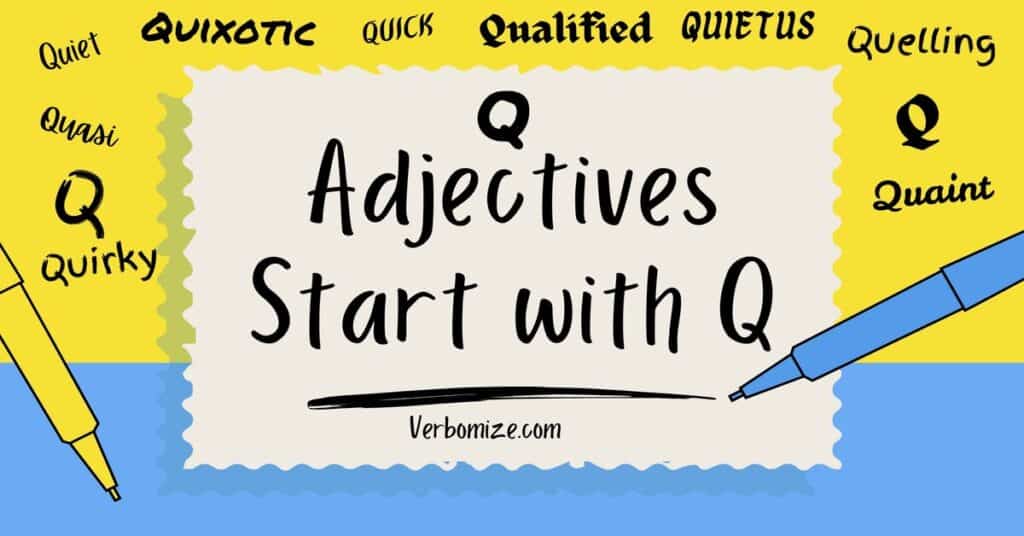Adjectives start with Q might sound like a linguistic challenge, but they’re your secret weapon to elevate your vocabulary and make your language sparkle! Have you ever wondered how these quirky words can transform your writing from mundane to magnificent?
Imagine impressing your friends, dazzling your colleagues, and adding unexpected flair to your conversations with just a handful of extraordinary Q-words. From “quixotic” to “quintessential,” these rare gems are about to become your new linguistic superstars, ready to inject personality and precision into every sentence you craft.
Understanding Q Adjectives: More Than Just Rare Words
Adjectives that start with Q are particularly special. While they may seem scarce, these descriptive q words pack an incredible punch in communication. From academic writing to creative expression, q adjectives can transform ordinary descriptions into extraordinary narratives.
Q Adjectives to Describe a Person: Character Insights
When seeking descriptive words starting with Q to describe a person, you’ll find a remarkable range of options:
- Quick-witted: A quintessential adjective from Q that describes someone intelligent and rapid in mental responses
- Quintessential: Representing the most typical or perfect example of a quality
- Quixotic: Describing an idealistic and somewhat impractical individual
- Querulous: Capturing someone prone to complaining or expressing discontent
- Quirky: Highlighting a person with unique, unexpected personality traits
- Quaint – Old-fashioned in a charming or unusual way.
- Quiet – Not loud; calm and serene in nature or behavior.
- Quizzical – Expressing curiosity or a puzzled reaction.
- Quick-witted – Able to respond or think rapidly with humor or intelligence.
- Qualified – Having the necessary skills or credentials.
- Quirky – Unconventional and distinctive in a way that’s endearing or unusual.
These adjectives are perfect for describing people who stand out, whether due to their calm demeanor, intelligence, or unique traits.
Adjectives for Describing Things or Places
Whether you’re writing about a setting or simply need a word to describe an object, these adjectives will help you convey more vivid and precise descriptions:
- Quaint – Describing something that is attractively old-fashioned or charming, often used for homes or towns.
- Quicksilver – Elusive, changeable, or mercurial in nature, often used to describe things that are hard to catch or hold.
- Quantum – Of, or relating to the smallest amount or degree of something.
- Quixotic – Idealistic but impractical or overly romantic in approach.
- Quality – High standard or excellence in appearance, functionality, or performance.
- Quarrelsome – Inclined to argue or fight.
These words help bring places, objects, or even ideas to life, offering specificity and emotional depth.
Adjectives for Describing Actions or Conditions
Sometimes, it’s not just people and objects that need to be described, but actions or states of being. These adjectives that starting with Q help convey the quality or state of a situation:
- Quick – Moving with speed or happening in a short time.
- Quotidian – Referring to something that happens daily or is ordinary.
- Quivering – Shaking slightly, often from fear or cold.
- Quenching – Satisfying thirst or extinguishing a fire, often used metaphorically to describe relief or satisfaction.
- Qualitative – Relating to the nature or quality of something, rather than its quantity.
- Quelling – Putting an end to something, like emotions or conflicts, often with force or authority.
Whether describing an action, event, or state of being, these words enhance your ability to specify how something is happening or what condition it’s in.
Adjectives for Emotional and Sensory Experiences
Feelings, emotions, and sensory experiences often need precise adjectives to convey the full range of human experiences. These “Q” adjectives are great for describing how someone feels or what they are sensing:
- Querulous – Complaining in a petulant or whining manner.
- Quietus – A final rest or calm, often used to describe a peaceful ending.
- Quixotic – Impractical, visionary, or overly idealistic in a way that often leads to disappointment.
- Quaint – Describes something charming, often in an unusual or old-fashioned way, that evokes a pleasant feeling.
- Quivering – Slightly shaking, often with emotion or sensitivity, suggesting an emotional response.
These words provide a rich vocabulary for describing both inner emotions and external sensations.
Unique Adjectives to Spice Up Your Writing
Finally, let’s look at some unique and unusual adjective of q that can spice up your writing and give it flair:
- Quotable – Worthy of being quoted; memorable and impactful.
- Quasi- – Partly or almost, often used to describe something that has a resemblance but isn’t fully something.
- Quiescent – In a state of inactivity or dormancy.
- Quadrupedal – Having four feet, typically used to describe animals.
- Quotidian – Relating to daily occurrences; something commonplace and often overlooked.
Incorporating these adjectives into your writing can lend a sense of sophistication or intrigue, depending on the context.
positive adjectives that start with q
- Quicksilver: Describing someone brilliantly adaptable and mercurial
- Quintessential: Representing the most perfect embodiment of a quality
- Quixotic: Showcasing noble, idealistic, and romantically ambitious traits
- Quietly Confident: Indicating inner strength without ostentation
- Quick-minded: Highlighting rapid intellectual processing
Intellectual Descriptive Words
- Questioning: Demonstrating profound curiosity and analytical thinking
- Quantum-intelligent: Suggesting extraordinary cognitive capabilities
- Qualitative: Indicating depth of understanding beyond surface-level perceptions
- Quasi-scholarly: Presenting an intellectual yet approachable demeanor
Emotional Q Descriptive Words
- Quiescent: Representing emotional maturity and inner calm
- Querulous: Capturing emotional sensitivity
- Quickening: Describing emotional responsiveness and depth
- Quintuple-hearted: Suggesting exceptional emotional capacity
Cultural and Geographical Q Descriptive Words
- Qatari: Relating to Qatar’s cultural context
- Quebecois: Describing Quebec’s distinct cultural identity
- Quechuan: Representing Andean cultural heritage
- Quadrilateral-minded: Suggesting multifaceted cultural understanding
Personal Characteristics Q Adjectives
Adjectives That Begin With Q offer nuanced ways to describe human traits:
- Questioning: Demonstrating intellectual curiosity
- Quiescent: Describing someone calm and inactive
- Quarrelsome: Indicating a tendency towards arguments
- Quick: Highlighting speed and responsiveness
- Quotable: Suggesting someone with memorable expressions
Cultural and Geographical Q Descriptors Words
- Qatari: Relating to Qatar’s inhabitants
- Quebecois: Describing people from Quebec
Adjectives Describing Personality and Behavior
- Quaint – A personality trait that is charmingly unusual or old-fashioned, often used to describe someone who has a unique, nostalgic flair.
- Quick-tempered – Easily angered or prone to irritation.
- Questionable – Doubtful, unreliable, or suspicious in character or quality.
- Quiet-spoken – Speaking softly, calm, and gentle in tone.
- Quizzical – Expressing curiosity or puzzlement, often with an inquisitive look.
- Quarrelsome – Prone to arguments or fights, often confrontational.
- Qualmish – Feeling uneasy or having a sense of doubt or worry, often in a moral or physical sense.
These adjectives help you express the nuances of people’s personalities and reactions, from endearing quirks to more challenging behaviors.
Adjectives to Describe Objects and Things
Objects and things can take on new depth and character with the right adjectives. Here are some “Q” adjectives perfect for describing physical items or objects:
- Quaint – Describing something charmingly old-fashioned or unique, such as a quaint piece of furniture or a quaint town.
- Quizzical – Having an intriguing or perplexing appearance, perhaps something that piques curiosity.
- Quarried – Describes materials or items that are extracted from a quarry, like quarried stone.
- Quantifiable – Something that can be measured or counted.
- Quick-release – A mechanism that enables fast detachment or removal, often used for machinery or devices.
- Quincunx – An arrangement of five things, with four positioned at the corners and one at the center, often used in reference to geometric patterns or landscaping.
These adjectives bring objects or items to life, adding details that make descriptions more vivid and engaging.
Adjectives for Describing Actions or Processes
In many contexts, it’s essential to describe how actions unfold or what qualities a process may have. These “Q” adjectives do just that:
- Quasi-automatic – Operating with minimal manual intervention, often used to describe processes that require some human input but are largely automated.
- Quickening – Becoming faster or more intense, often used to describe the pace of something accelerating.
- Quoting – Repeating or citing someone else’s words, often with accuracy or authority.
- Qualifying – Adding conditions or restrictions, often used in a context of making something eligible or suitable for a specific purpose.
- Quenching – Stopping or suppressing, as in putting out a fire or quenching thirst.
- Quixotizing – Engaging in actions based on idealistic but impractical visions, often seen in adventurous or romantic pursuits.
These verbs enhance descriptions of processes and actions, allowing for a deeper exploration of how things happen or how we respond to certain circumstances.
Describing Sensory Experiences or Feelings
Describing sensory experiences or emotions vividly makes your communication more relatable. Here are “Q” adjectives that help paint a sensory or emotional picture:
- Quivering – A slight, trembling movement often associated with fear, excitement, or cold.
- Queasy – Feeling uneasy, nauseous, or disturbed, typically referring to physical sensations like stomach discomfort.
- Quenched – Refreshed or satisfied, particularly in relation to thirst or hunger.
- Quixotic – Idealistic and impractical, describing someone whose emotions or actions are guided by unrealistic hopes.
- Quieting – Calming or soothing, such as the effect of a quiet space on a troubled mind.
- Quizzical – Displaying curiosity, skepticism, or a puzzled expression.
These adjectives can enhance how you convey emotional and sensory experiences, giving more depth and detail to your descriptions.
Unique Adjectives for Describing Nature and the Environment
Nature and the environment often need rich adjectives to evoke the beauty, serenity, or harshness of the natural world. These “Q” adjectives fit the bill:
- Quaking – Shaking or trembling, often used to describe something in motion or shaking with force.
- Quiet – Peaceful and still, often used to describe a tranquil environment or place.
- Quenched – Referring to the effect of water or moisture that has refreshed or sustained something, such as the earth after rain.
- Quixotic – Describing something or someone whose actions are dictated by impractical ideals, much like a knight embarking on a wild journey.
- Quarry – A term used to describe a place where stones, minerals, or other materials are extracted, often used in describing a rugged or industrious environment.
- Quiescent – In a state of rest, dormancy, or inactivity, perfect for describing a serene and still environment or state.
These adjectives give you powerful ways to describe landscapes, natural phenomena, and the emotions they inspire.
Adjectives for Describing People’s Appearance
Appearance is another area where adjectives can do wonders. These “Q” adjectives provide more options for describing how people look:
- Quick-witted – Describes someone with a sharp, fast-thinking mind, often visible in their facial expressions or repartee.
- Quizzical – A look or expression that suggests confusion or curiosity.
- Qualifiable – Possessing characteristics or features that make someone eligible for a particular role or category, often based on appearance or ability.
- Quietly attractive – Subtle or understated in physical beauty, not overt but still noticeable in its own way.
- Queer-looking – Describing someone or something with an unconventional, non-standard appearance.
- Quaintly dressed – Wearing clothing that is charmingly old-fashioned or unique.
These adjectives give more ways to describe the various aspects of someone’s appearance, from physical traits to their unique style or mannerisms.
Describing Concepts, Ideas, or Abstract Thoughts
Sometimes, the most challenging things to describe are concepts or abstract thoughts. But with these “Q” adjectives, you can bring these ideas into focus:
- Quintessential – Representing the perfect example or embodiment of a particular type or quality.
- Quizzical – Expressing curiosity or doubt about an idea or concept, often used to describe abstract inquiries.
- Quantitative – Relating to something that can be measured or expressed in numbers, often used in the context of data or research.
- Quasi-real – Existing in a state that resembles reality but is not entirely real, often used in philosophical or theoretical discussions.
- Quarky – Referring to something that is tiny, fundamental, or quirky, like the subatomic particles in physics.
These adjectives help communicate the intangible aspects of our world, bringing clarity to abstract concepts and theories.
Adjectives for Describing People’s Moods and Emotions
Understanding moods and emotions is key in human communication, and these “Q” adjectives will help describe a wide range of emotional states and expressions:
- Quarrelsome – Tending to argue or fight; someone who is argumentative or difficult.
- Queasy – Feeling nauseous, unsettled, or uncomfortable, often in a physical sense.
- Quick-tempered – Prone to anger or irritation, someone who reacts quickly to frustration.
- Quizzical – Indicating mild confusion or curiosity, especially in reaction to something unexpected.
- Quiescent – Calm, quiet, and still, often used to describe someone who is at peace or inactive.
- Qualmish – Feeling uneasy or doubtful about something, often in a moral or physical sense.
These adjectives are great for conveying the complex emotional states that people experience, from irritability to unease and peacefulness.
Describing Attitudes and Behavior
Attitudes and behaviors reflect how people approach the world, interact with others, and handle situations. The following “Q” adjectives help define a wide array of behavioral traits:
- Quiet – Calm, unassuming, and reserved in demeanor.
- Quick-witted – Able to think and respond quickly with sharp humor or intelligence.
- Quixotic – Guided by idealism and unrealistic or impractical ideas.
- Quarrelsome – Inclined to start arguments or conflicts, often combative in nature.
- Qualified – Having the necessary skills, experience, or credentials to perform a task or role.
- Queer – Odd or unusual in a way that defies conventions; also used historically to describe something unconventional.
These adjectives add depth to your descriptions of how individuals approach situations and interact with the world around them.
Adjectives for Describing Objects and Things
Now, let’s explore some unique “Q” adjectives for describing physical things, from everyday items to special features that set objects apart:
- Quantifiable – Something that can be measured or expressed in terms of quantity, often used in contexts like data or research.
- Quilted – Having a pattern or texture resembling that of a quilt, often used to describe fabrics or materials.
- Quizzical – Often used to describe an object that appears mysterious, puzzling, or intriguing.
- Quenched – Describes something that has been satisfied, such as thirst or a fire that has been put out.
- Quarried – Referring to materials that have been extracted from a quarry, such as stone or marble.
- Quick-release – Describes a mechanism designed for easy or rapid detachment, such as in tools or machinery.
These adjectives are handy for describing tangible items and their characteristics, enhancing the specificity of your descriptions.
Describing Nature and the Environment
Nature is full of stunning complexity, and the following adjectives can help convey its beauty or harshness:
- Quiescent – In a state of rest or dormancy, such as a forest in winter or a dormant volcano.
- Quaking – Shaking or trembling, often used to describe a natural event like an earthquake or the motion of trees in a storm.
- Quenchless – Impossible to satisfy or extinguish, often used to describe an unrelenting force like thirst or fire.
- Quarry-like – Resembling or related to a quarry; often used to describe harsh, jagged environments or places where mining occurs.
- Quiet – Describes an environment that is peaceful, still, and free from noise or disturbance.
- Quilted – Referring to something layered, like a quilted mountain range or hillsides that are layered with flora or snow.
These adjectives can be used to evoke natural imagery, describing everything from serene environments to powerful natural forces.
Adjectives to Describe Actions or Processes
Whether you’re describing a process or an action, the right adjective can provide greater clarity and depth. These “Q” adjectives help explain how things unfold or progress:
- Quickening – Becoming faster or more intense, especially in relation to time, events, or emotions.
- Quoting – The act of repeating or citing someone else’s words.
- Quasi-automatic – Operating with minimal intervention or control, typically referring to machines or systems.
- Qualifying – Adding conditions or limits, often used in the context of making something eligible or suitable.
- Quenching – To extinguish or satisfy, often used in relation to thirst or fire.
- Quixoticizing – To embark on an idealistic or impractical pursuit, often used in a creative or adventurous context.
These adjectives are perfect for describing the nature of how things happen or the way actions unfold.
Describing the Sensory Experience
The world of sensory experiences—sight, sound, touch, taste, and smell—can be richly described with the right adjectives. Here are “Q” adjectives to enhance these descriptions:
- Quivering – Shaking slightly due to emotion, cold, or fear, often referring to a subtle but noticeable movement.
- Queasy – A feeling of discomfort or nausea, often associated with motion sickness or anxiety.
- Quenched – Satisfied or relieved, especially when describing thirst or desires being fulfilled.
- Quick – Sharp or immediate in action, such as a quick motion or rapid change.
- Quizzical – Displaying curiosity or confusion, often used in response to something puzzling or unexpected.
- Quotable – Worth repeating or quoting, often used in reference to striking or memorable remarks.
These adjectives can help convey the subtleties of physical sensations and emotional reactions, making your descriptions more vivid.
Describing Time and Events
Time and events are often best expressed with adjectives that convey their pace, importance, or nature. The following “Q” adjectives serve this purpose:
- Quick – Happening or moving with speed; something that is brief or fleeting in duration.
- Quotidian – Occurring daily or routinely; something that is ordinary or customary.
- Quantum – Denoting the smallest possible amount or increment, often used in contexts such as physics or technology.
- Quixotic – An idealistic or romantic pursuit that is impractical or unlikely to succeed, often used in reference to grand, misguided adventures.
- Quiet – A term often used to describe peaceful, uneventful moments or calm periods of time.
- Qualifying – Having conditions attached to something, such as an event or offer being conditional upon certain terms.
These adjectives help paint a picture of time, events, and the passage of moments, from fast-paced to routine.
Describing Ideas and Abstract Concepts
Ideas and abstract thoughts are often hard to describe, but these adjectives can help make them more tangible and clear:
- Quintessential – Representing the perfect or most typical example of something, often used to describe ideals or the best of a category.
- Quasi-real – Something that is almost real or exists in a state between reality and imagination, often used in philosophical discussions.
- Quasi-abstract – Partly abstract or conceptual in nature, often used to describe something that is not entirely tangible.
- Quantitative – Relating to something that can be measured in numbers, such as data or metrics.
- Quixotic – Describing ideas that are idealistic or impractical, often representing a lofty, often unrealistic vision.
- Quaint – Describing something old-fashioned or charming, often used to convey nostalgia or uniqueness in concepts or styles.
These adjectives are particularly useful when discussing abstract ideas, philosophical concepts, or idealistic theories.
Practical Applications of Q Adjectives
How to Use Q Adjectives Effectively
- Understand the precise meaning of each q adjective
- Practice incorporating these descriptive words in conversations
- Read widely to encounter these unique descriptive q words in context
- Use q adjectives sparingly for maximum impact
Conclusion: The Power of Q Adjectives
Adding adjectives starting with Q to your vocabulary can offer a fun and insightful way to express yourself more clearly and creatively. Whether you’re describing personalities, places, actions, or emotions, these adjectives help provide specificity and color to your language.
So next time you’re searching for the right word, think about using one of these “Q” adjectives. You might find that adding just the right touch of vocabulary can make your writing or speech more dynamic, vivid, and memorable.
MCQ Quiz: Unique Adjectives beginning with Q
Test your knowledge of the unique words that start with q adjectives that we covered in the article! Choose the best answer for each question. The correct answers are provided after each question.
1. Which of the following adjectives means “to be easily angered or irritated”?
a) Quixotic
b) Quick-tempered
c) Quiet
d) Quarrelsome
Answer: b) Quick-tempered
Explanation: “Quick-tempered” refers to someone who becomes angry easily.
2. Which of the following adjectives best describes something that is “unusual and charmingly old-fashioned”?
a) Quixotic
b) Quantifiable
c) Quilted
d) Quaint
Answer: d) Quaint
Explanation: “Quaint” refers to something that is charmingly old-fashioned or unusual.
3. What does the adjective “quizzical” describe?
a) Something that is calm and peaceful
b) A puzzled or curious expression
c) A highly idealistic person
d) Something that can be measured
Answer: b) A puzzled or curious expression
Explanation: “Quizzical” describes an expression that conveys curiosity or confusion.
4. Which adjective refers to something “that can be measured or counted”?
a) Quiescent
b) Quasi-automatic
c) Quantifiable
d) Quick-release
Answer: c) Quantifiable
Explanation: “Quantifiable” means something that can be measured or expressed in numbers.
5. Which adjective would best describe a “prone to argue or fight” person?
a) Quick-witted
b) Quixotic
c) Quarrelsome
d) Quiet-spoken
Answer: c) Quarrelsome
Explanation: “Quarrelsome” describes someone who tends to argue or start fights.
6. What does the adjective “quiescent” mean?
a) Active and energetic
b) Resting or dormant
c) Puzzled and confused
d) Highly emotional
Answer: b) Resting or dormant
Explanation: “Quiescent” means in a state of rest or dormancy, without activity.
7. Which adjective would describe something that “operates with minimal intervention”?
a) Quizzical
b) Quick-release
c) Quasi-automatic
d) Quarried
Answer: c) Quasi-automatic
Explanation: “Quasi-automatic” refers to something that operates with minimal human intervention.
8. What does “quixotic” describe?
a) Practical and realistic
b) Extremely idealistic but impractical
c) Cold and emotionless
d) Intellectually quick and sharp
10. Which adjective best fits something that is “likely to be quoted or cited due to its memorability”?
a) Quiet
b) Quotable
c) Quilted
d) Quenched
Answer: b) Quotable
Explanation: “Quotable” refers to something worthy of being quoted due to its impact or memorability.
11. What does the adjective “quasi-real” describe?
a) Something completely real
b) Something partly real or existing between reality and imagination
c) A measurable object
d) An idealistic person
Answer: b) Something partly real or existing between reality and imagination
Explanation: “Quasi-real” refers to something that is not entirely real but seems real in some way.
12. Which adjective describes something “related to the extraction of materials from a quarry”?
a) Quick-release
b) Quarried
c) Quenching
d) Quiet
Answer: b) Quarried
Explanation: “Quarried” refers to materials or objects that are extracted from a quarry.
13. The adjective “quintessential” refers to what?
a) Something that is not easily defined
b) The best or most typical example of something
c) A highly abstract concept
d) A large, measurable amount
Answer: b) The best or most typical example of something
Explanation: “Quintessential” refers to the most perfect or ideal example of something.
14. Which of these adjectives best describes an object that has “a pattern resembling that of a quilt”?
a) Quizzical
b) Quick-witted
c) Quilted
d) Quenched
Answer: c) Quilted
Explanation: “Quilted” refers to something that has a pattern or texture similar to that of a quilt.
15. What does the adjective “quick-witted” mean?
a) Always quick to anger
b) Able to respond with humor or intelligence
c) Describing someone who rarely speaks
d) Someone who enjoys debating
Answer: b) Able to respond with humor or intelligence
Explanation: “Quick-witted” describes someone who can think and respond rapidly, often with humor or sharp intelligence.
16. Which adjective describes a “place or environment that is peaceful and still”?
a) Quick-tempered
b) Quiet
c) Quixotic
d) Queasy
Answer: b) Quiet
Explanation: “Quiet” describes an environment or space that is peaceful, calm, and free from noise.
17. What does “quaint” typically describe?
a) Modern and trendy
b) An idealistic vision
c) Old-fashioned and charming
d) Practical and functional
Answer: c) Old-fashioned and charming
Explanation: “Quaint” refers to something that is old-fashioned in a charming or attractive way.
18. The term “quasi-abstract” would most likely describe what?
a) Something fully abstract
b) Something that is partly abstract and conceptual
c) A physical object
d) A highly idealized thought
Answer: b) Something that is partly abstract and conceptual
Explanation: “Quasi-abstract” refers to something that exists between being abstract and tangible.
19. Which of the following adjectives would describe “something that is fundamental and exists in tiny amounts”?
a) Quenchless
b) Quantum
c) Quixotic
d) Quizzical
Answer: b) Quantum
Explanation: “Quantum” refers to the smallest possible amount or increment, often used in physics or technology.
20. “Quenching” usually refers to which of the following?
a) Igniting a fire
b) Stopping or satisfying thirst
c) Starting a process
d) Expressing curiosity
Answer: b) Stopping or satisfying thirst
Explanation: “Quenching” is used to describe satisfying thirst or putting out a fire.
21. Which of these adjectives would describe something “ordinary or daily”?
a) Quixotic
b) Quotidian
c) Quietus
d) Quirky
Answer: b) Quotidian
Explanation: “Quotidian” refers to something that happens every day or is common.
22. The adjective “quarrelsome” is used to describe a person who is likely to:
a) Stay calm in most situations
b) Avoid conflict
c) Start arguments or fights
d) Speak softly
Answer: c) Start arguments or fights
Explanation: “Quarrelsome” describes someone who often argues or fights.
23. Which of these adjectives would best describe “an object or item that is puzzling or mysterious”?
a) Quiet
b) Quizzical
c) Quirky
d) Quantifiable
Answer: b) Quizzical
Explanation: “Quizzical” refers to something that invokes curiosity or confusion, often in an intriguing way.
24. “Quirky” refers to a person or thing that is:
a) Boring and unremarkable
b) Unusual in a charming or odd way
c) Practical and efficient
d) Formal and traditional
Answer: b) Unusual in a charming or odd way
Explanation: “Quirky” refers to something or someone with distinctive, unconventional qualities that are often endearing.
25. Which adjective refers to “something that is odd, unconventional, or out of the norm”?
a) Quiet
b) Queer
c) Qualitative
d) Quantitative
Answer: b) Queer
Explanation: “Queer” can describe something unconventional or out of the norm.

Jone Smith is an experienced blogger and content creator behind Verbo Mize. With a passion for storytelling and insightful commentary, Jone brings a wealth of knowledge on diverse topics. His expertise in blogging, combined with a keen eye for detail, makes his work both informative and engaging, offering readers valuable perspectives on a wide range of subjects.







